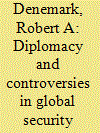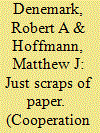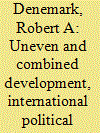|
|
|
Sort Order |
|
|
|
Items / Page
|
|
|
|
|
|
|
| Srl | Item |
| 1 |
ID:
165321


|
|
|
|
|
| Summary/Abstract |
In this work we identify elements of diplomacy as mechanisms with which to sharpen our understanding of security studies and weigh some claims regarding conflict. Diplomatic considerations have long been out of fashion in the field of global politics, and we seek to re- introduce them. In so doing, we situate ourselves within the general context of Goddard and Nexon's reformulation of security studies. We then identify two controversial questions in the security studies literature and consider them with reference to diplomatic interactions. The first of these is the argument raised by Jack Levy and William R. Thompson suggesting that great sea powers generate different balance of power dynamics than great land powers. We find support for the majority of their suggestions. The second controversy, closely associated with the work of T.V. Paul, concerns ‘soft balancing’ and arose to help explain the lack of balancing behaviors relative to the unipolar position of the United States after 1989. Soft balancing is controversial in part because identifying it requires us to understand the specific intent of various foreign policy actions. We use diplomatic activities to address the problem of intent, and find support for soft balancing in the diplomatic record.
|
|
|
|
|
|
|
|
|
|
|
|
|
|
|
|
| 2 |
ID:
082692


|
|
|
|
|
| Publication |
2008.
|
| Summary/Abstract |
Despite its importance in the global system, the literature provides little guidance on how treaty-making emerged as a well-accepted practice. In either assuming the appropriateness of treaty-making (and then analysing design) or treating treaties as strategic choices in the pursuit of gains (without analysing how treaties came to be a way to pursue gains), the current literature discounts the emergence and evolution of treaty-making. This lacuna contributes to a biased view of treaty-making as the epiphenomenal result of specific, ahistorical factors, rather than as a patterned, historical practice. We contend that the evolution of the practice of treaty-making is significant for questions of design/compliance, the future of multilateral interaction and global order. In addressing this concern, we pursue two linked goals. The first is self-consciously descriptive. We introduce a dataset of multilateral treaties that provides a novel picture of treaty-making across time, space and issue-areas. The second goal is explanatory. We develop and test a social constructivist and path-dependent explanation for the patterns of treaty-making evident in the data, especially 150 years of exponential growth, the spread of treaty-making across multiple issues and the diffusion of the practice across the world.
|
|
|
|
|
|
|
|
|
|
|
|
|
|
|
|
| 3 |
ID:
179049


|
|
|
|
|
| Summary/Abstract |
Rosenberg and Boyle's ‘Understanding 2016: China, Brexit and Trump in the history of uneven and combined development’ (2019) is an insightful analysis. It leverages the theory of uneven and combined development (UCD) derived from Trotsky's work on the puzzle of why the proletarian revolution emerged in underdeveloped Russia. The analysis fulfills many of the requirements for reinvigorating IPE set out by dissatisfied senior scholars who lament the narrowing of the study of IPE. But UCD is not unique in this regard. It shares many attributes with world-systems analysis (WSA). I argue that instead of searching for philosophical excuses for ignoring others, we should speak to similarities as well as differences, and seek insights from other perspectives. WSA insights on China, the west, the nature of combination and inequality, and the periphery, are then reviewed. I conclude that scholars of UCD and WSA should be considering one another’s work.
|
|
|
|
|
|
|
|
|
|
|
|
|
|
|
|
|
|
|
|
|